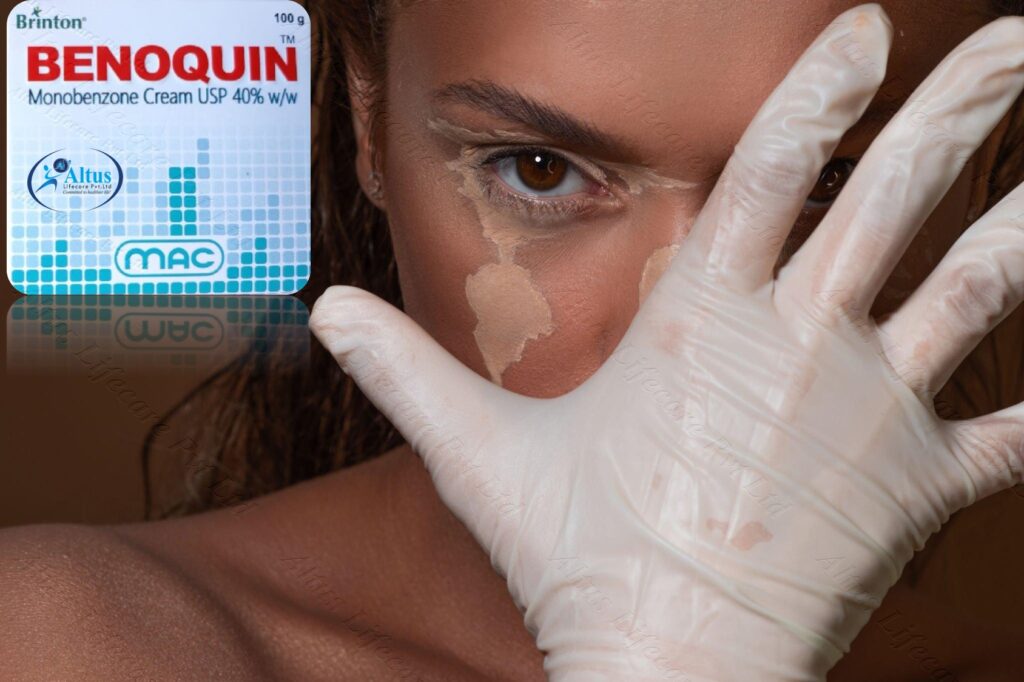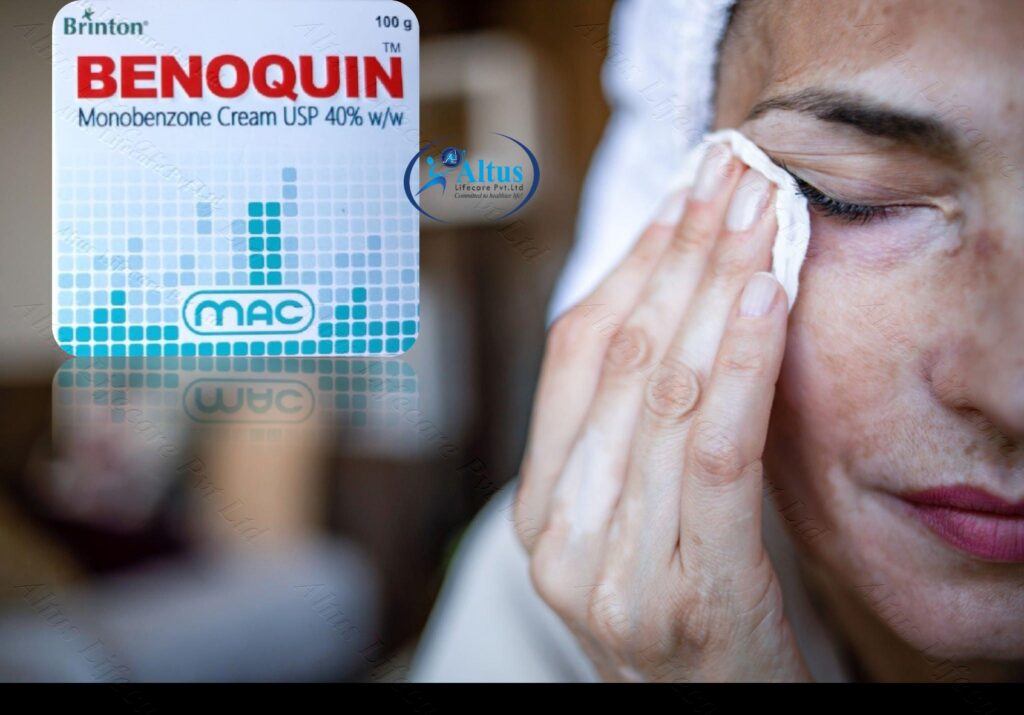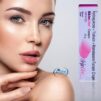“Reveal Your True Colors: Embrace Transformation with Monobenzone Cream and Embody Unparalleled Confidence”
“Reveal Your True Colors: Embrace Transformation with Monobenzone Cream and Embody Unparalleled Confidence”
Introduction:

“Reveal Your True Colors: Embrace Transformation with Monobenzone Cream and Embody Unparalleled Confidence”
Monobenzone cream is a topical medication that has gained attention in the field of dermatology due to its unique properties. It is primarily used for depigmentation purposes, specifically in the treatment of vitiligo. This article aims to provide a comprehensive overview of Monobenzone cream, including its uses, benefits, and potential side effects.
What is Monobenzone Cream?
Monobenzone cream is a depigmenting agent that works by reducing the amount of melanin in the skin. Melanin is responsible for the colour of our skin, hair, and eyes. In individuals with vitiligo, the immune system attacks and destroys the melanocytes, leading to patches of depigmented skin. Monobenzone cream is applied topically to the affected areas to further depigment the skin and create a more uniform appearance.

Uses and Benefits:
Vitiligo Treatment: Monobenzone cream is primarily prescribed for individuals with vitiligo. It helps to lighten the normal skin surrounding the depigmented patches, thus achieving a more even skin tone. This can be particularly beneficial for individuals with widespread vitiligo who desire a uniform appearance.
Cosmetics: Monobenzone cream is sometimes used for cosmetic purposes to achieve skin depigmentation. Some individuals may choose to lighten their skin tone or reduce the appearance of hyperpigmentation caused by conditions like melasma or post-inflammatory hyperpigmentation. However, it is crucial to consult a dermatologist before using Monobenzone cream for cosmetic reasons, as it is a potent agent that requires proper supervision and guidance.
Tattoo Removal: In some cases, Monobenzone cream may be used to lighten or remove unwanted tattoos. Its depigmenting properties can help fade the pigmentation of the tattooed area, making subsequent laser tattoo removal treatments more effective.

Side Effects:
While Monobenzone cream can be effective in depigmenting the skin, it is essential to be aware of potential side effects. These include:
Hypopigmentation: The primary side effect of Monobenzone cream is hypopigmentation, which means the lightening or loss of skin colour beyond the targeted areas. This can lead to a significant difference in skin tone between the treated and untreated areas.
Sensitivity and Irritation: Some individuals may experience skin irritation, redness, itching, or burning sensations at the application site. It is important to discontinue use and consult a dermatologist if these side effects occur.
Sun Sensitivity: Monobenzone cream can make the treated skin more sensitive to sunlight. It is crucial to protect the skin from excessive sun exposure by wearing protective clothing and using sunscreen with a high SPF.

Before using Monobenzone cream, it is important to consider a few key points:
Consultation with a Dermatologist: Prior to starting any treatment with Monobenzone cream, it is crucial to consult with a dermatologist. A professional evaluation is necessary to determine the suitability of this medication for your specific condition, assess potential risks, and develop an appropriate treatment plan.
Patch Test: A patch test may be conducted by the dermatologist to check for any adverse reactions or allergies. This involves applying a small amount of the cream to a small area of skin and monitoring the reaction over a period of time. If any signs of irritation or allergic response occur, it is essential to discontinue use and consult the dermatologist immediately.
Gradual Application: Monobenzone cream is typically applied gradually to the affected areas to achieve the desired level of depigmentation. The dermatologist will determine the appropriate concentration and application regimen for your specific needs. It is important to follow their instructions carefully and avoid overusing the cream, as excessive depigmentation may occur.
Psychological Considerations: While Monobenzone cream can be effective in treating vitiligo, it is important to consider the potential psychological impact of altering one’s skin tone. Discussing these concerns with a dermatologist or seeking support from a mental health professional can be helpful in addressing any emotional or self-esteem issues associated with the condition and its treatment.
Long-term Use: The long-term effects of using Monobenzone cream have not been extensively studied. It is important to monitor the skin closely during and after treatment and report any unexpected changes or concerns to your dermatologist.
Conclusion:
Monobenzone cream is a depigmenting agent primarily used for the treatment of vitiligo. Its ability to reduce melanin production in the skin can help achieve a more even skin tone. However, it is important to use Monobenzone cream under the guidance of a dermatologist, as it carries potential side effects such as hypopigmentation and skin irritation. If you are considering using Monobenzone cream for cosmetic purposes or tattoo removal, it is crucial to consult a healthcare professional to ensure its safe and appropriate use.
Conclusion:
Monobenzone cream is a depigmenting agent used primarily in the treatment of vitiligo. It can help achieve a more uniform skin tone by reducing melanin production in the skin. However, its use should be approached with caution and under the guidance of a dermatologist. Adverse effects such as hypopigmentation, skin irritation, and sun sensitivity may occur. Prior consultation with a dermatologist, adherence to their instructions, and regular monitoring of the skin are crucial to ensure safe and effective use of Monobenzone cream.

Frequently Asked Questions (FAQ) about Monobenzone Cream:
Q: What is the recommended dosage and application of Monobenzone cream?
A: The dosage and application of Monobenzone cream can vary depending on the individual’s condition and the dermatologist’s recommendation. It is important to follow the specific instructions provided by the healthcare professional. Typically, the cream is applied to the affected areas once or twice daily, gradually increasing the application over time to achieve the desired level of depigmentation.
Q: How long does it take to see results with Monobenzone cream?
A: The response to Monobenzone-cream can vary from person to person. Some individuals may start seeing results within a few weeks, while others may require several months of consistent use. It is important to have realistic expectations and be patient with the treatment process. Regular follow-ups with the dermatologist can help assess the progress and make any necessary adjustments to the treatment plan.
Q: Can Monobenzone cream be used on all skin types?
A: Monobenzone-cream can generally be used on different skin types. However, individuals with darker skin tones may be more prone to hypopigmentation or uneven depigmentation. It is essential to consult with a dermatologist to evaluate the suitability of Monobenzone-cream for your specific skin type and condition.
Q: Are there any alternatives to Monobenzone-cream for treating vitiligo?
A: Yes, there are alternative treatments available for vitiligo. These may include topical corticosteroids, calcineurin inhibitors, phototherapy, and surgical options like skin grafting or tattooing. The choice of treatment depends on the individual’s condition, preferences, and the dermatologist’s assessment. It is best to discuss the available options with a healthcare professional to determine the most suitable treatment approach.
Q: Can Monobenzone cream be used for skin lightening purposes?
A: While Monobenzone-cream has been used for cosmetic skin lightening purposes, it is important to note that its use for such purposes should be approached with caution. Skin lightening should be done under the supervision of a dermatologist to ensure safety and minimize potential risks. Self-medication or misuse of Monobenzone-cream for cosmetic purposes is not recommended.
Q: What precautions should be taken while using Monobenzone cream?
A: When using Monobenzone-cream, it is important to take the following precautions:
Avoid contact with eyes, nose, and mouth.
Protect the treated areas from excessive sun exposure by using sunscreen and wearing protective clothing.
Discontinue use and consult a dermatologist if any signs of irritation, allergic reactions, or unexpected changes in the skin occur.
Follow the recommended application regimen and dosage as instructed by the healthcare professional.
Remember, it is always best to consult with a dermatologist or healthcare professional for personalized advice regarding the use of Monobenzone cream or any other medical treatment.
Q: Are there any known drug interactions with Monobenzone cream?
A: Currently, there are no significant drug interactions reported specifically with Monobenzone-cream. However, it is always important to inform your healthcare provider about all the medications, including over-the-counter drugs, herbal supplements, and vitamins, that you are taking. This information will help the healthcare professional assess any potential interactions and provide appropriate guidance.
Q: Can Monobenzone cream be used during pregnancy or breastfeeding?
A: The use of Monobenzone-cream during pregnancy or breastfeeding should be discussed with a healthcare professional. Limited data is available on the safety of using Monobenzone-cream during these periods, and the potential risks and benefits need to be carefully evaluated. It is important to consult a dermatologist or obstetrician who can provide personalized advice based on your specific situation.
Q: What should I do if I accidentally apply too much Monobenzone cream?
A: If you accidentally apply too much Monobenzone-cream, gently remove the excess cream with a clean tissue or cotton pad. Avoid rubbing or scrubbing the skin vigorously. If you experience any irritation or discomfort, it is advisable to wash the area with mild soap and water and consult a dermatologist if necessary. Following the recommended application guidelines can help prevent overuse and minimize potential side effects.
Q: Can Monobenzone cream be used on children?
A: The use of Monobenzone-cream in children should be determined by a dermatologist. They will assess the child’s condition, the potential benefits, and the risks involved. The safety and effectiveness of Monobenzone-cream in paediatric patients may vary, so it is important to seek professional medical advice before using this medication on children.
Q: Can Monobenzone cream reverse depigmentation caused by conditions other than vitiligo?
A: Monobenzone-cream is primarily used for depigmentation in vitiligo. Its effectiveness in reversing depigmentation caused by other conditions, such as melasma or post-inflammatory hyperpigmentation, may be limited. It is important to consult a dermatologist for a proper evaluation and to explore alternative treatments that may be more suitable for these specific conditions.
Q: Is Monobenzone cream a permanent solution for depigmentation?
A: Monobenzone-cream can achieve significant depigmentation, but its effects may not be permanent. Once the desired level of depigmentation is achieved, it is important to follow a maintenance plan recommended by the dermatologist. This may include periodic applications or other treatments to maintain the desired results. Regular follow-ups with a dermatologist are essential to assess the skin’s response and adjust the treatment plan as needed.
Always consult a healthcare professional or dermatologist for personalized advice and answers to any specific questions or concerns regarding the use of Monobenzone-cream.
Q: What are the alternatives to Monobenzone cream for depigmentation?
A: There are alternative treatments available for depigmentation, depending on the underlying condition and individual factors. Some alternatives include topical corticosteroids, calcineurin inhibitors, laser therapy, micro needling, and surgical options like skin grafting or tattooing. The choice of alternative treatment depends on the specific situation and should be discussed with a dermatologist who can provide personalized recommendations based on the individual’s needs.
Q: Can Monobenzone cream be used on all areas of the body?
A: Monobenzone-cream can generally be used on various areas of the body. However, some areas may be more sensitive or prone to adverse reactions. It is important to follow the instructions provided by the dermatologist and avoid applying the cream to sensitive areas like the eyes, mucous membranes, or broken skin. If you have concerns about using Monobenzone-cream on specific areas, it is best to consult with a healthcare professional for guidance.
Q: How long should I continue using Monobenzone cream?
A: The duration of Monobenzone-cream use can vary depending on the individual’s response and the treatment plan recommended by the dermatologist. In the case of vitiligo, it may be necessary to use the cream for an extended period to achieve and maintain the desired depigmentation. Regular follow-up appointments with the dermatologist are essential to assess the progress and determine the appropriate duration of treatment.
Q: Can Monobenzone cream cause permanent depigmentation?
A: Yes, Monobenzone-cream has the potential to cause permanent depigmentation in the treated areas. This is a desired outcome for individuals with vitiligo, as it helps achieve a more uniform skin tone. However, it is important to use the cream under the supervision of a healthcare professional to minimize the risk of excessive depigmentation or uneven results.
Q: Can Monobenzone cream be used for other pigmentation disorders?
A: Monobenzone-cream is primarily indicated for the treatment of vitiligo. While it may have some efficacy in reducing pigmentation in other conditions, such as melasma or post-inflammatory hyperpigmentation, it is not typically the first-line treatment for these disorders. Other treatment options may be more suitable, and it is recommended to consult a dermatologist for a proper evaluation and personalized treatment plan.
Q: How should Monobenzone cream be stored?
A: Monobenzone-cream should be stored in accordance with the instructions provided by the manufacturer or healthcare professional. Generally, it should be kept in a cool, dry place, away from direct sunlight, and out of the reach of children. Following the recommended storage guidelines helps maintain the stability and effectiveness of the cream.
It is important to note that the information provided here is for general knowledge and should not replace professional medical advice. Consultation with a dermatologist or healthcare professional is essential for accurate diagnosis, individualized treatment plans, and answers to specific questions related to the use of Monobenzone-cream.
Q: Can Monobenzone cream be used for freckle or mole removal?
A: No, Monobenzone-cream is not intended for freckle or mole removal. It is specifically designed for depigmentation purposes in the treatment of vitiligo. Freckles and moles are caused by a different mechanism and may require alternative treatments, such as laser therapy, cryotherapy, or surgical excision. It is important to consult a dermatologist to determine the appropriate treatment options for freckles or moles.
Q: Can Monobenzone cream be used for treating hyperpigmentation caused by sun damage?
A: Monobenzone-cream is not typically used for treating hyperpigmentation caused by sun damage. Sun-induced hyperpigmentation often involves an overproduction of melanin in response to sun exposure. Other treatment options, such as topical skin lightening agents containing hydroquinone, retinoids, or alpha hydroxy acids, may be more effective for addressing sun-related hyperpigmentation. It is advisable to consult a dermatologist for a proper evaluation and recommendation.
Q: Can Monobenzone cream be used to lighten scars?
A: Monobenzone-cream is not commonly used to lighten scars. Scars have a different composition and require specialized treatments. Depending on the type and characteristics of the scar, treatments such as silicone gel sheets, corticosteroid injections, laser therapy, or surgical procedures may be more appropriate. It is essential to consult a dermatologist or plastic surgeon for a comprehensive evaluation and personalized treatment plan for scar management.
Q: Does Monobenzone cream have any permanent side effects?
A: Monobenzone cream has the potential to cause permanent depigmentation in the treated areas. This is an intended outcome when used for vitiligo treatment. However, if used improperly or excessively, it can result in uneven or excessive depigmentation, leading to permanent changes in skin colour. It is important to use Monobenzone-cream under the guidance of a healthcare professional and follow their instructions to minimize the risk of permanent side effects.
Q: Is Monobenzone cream available over-the-counter?
A: Monobenzone-cream is generally not available over-the-counter and requires a prescription from a healthcare professional, such as a dermatologist. The potent depigmenting properties of Monobenzone-cream necessitate proper medical supervision and monitoring to ensure its safe and appropriate use.
Q: Can Monobenzone cream be used in combination with other topical medications?
A: The use of Monobenzone-cream in combination with other topical medications should be discussed with a dermatologist or healthcare professional. They can evaluate the compatibility of different treatments and determine the appropriate combination, if necessary. It is important to disclose all the medications, including topical treatments that you are using to avoid any potential interactions or adverse effects.
As always, it is crucial to consult with a healthcare professional, preferably a dermatologist, for accurate information and personalized guidance regarding the use of Monobenzone-cream or any other medical treatment.
Q: Are there any known common side effects of Monobenzone cream?
A: Common side effects of Monobenzone-cream may include mild skin irritation, redness, itching, or a burning sensation at the application site. These side effects are usually temporary and subside with continued use. However, if the side effects persist or worsen, it is important to discontinue use and consult a dermatologist.
Q: Can Monobenzone cream cause skin sensitivity to sunlight?
A: Yes, Monobenzone-cream can increase the skin’s sensitivity to sunlight. It is crucial to protect the treated areas from excessive sun exposure by using sunscreen with a high SPF, wearing protective clothing, and seeking shade when outdoors. Failure to protect the skin adequately may result in sunburn or other sun-related damage.
Q: What should I do if I forget to apply Monobenzone cream?
A: If you forget to apply Monobenzone-cream at the scheduled time, it is generally recommended to resume the regular application as soon as you remember. However, if it is close to the time for your next scheduled application, it is advisable to skip the missed dose and continue with the regular dosing schedule. Do not double the dose to make up for a missed application.
Q: Can Monobenzone cream be used on sensitive or broken skin?
A: Monobenzone-cream should not be used on sensitive or broken skin unless specifically instructed by a healthcare professional. Applying the cream to sensitive or broken skin can cause increased irritation or discomfort. It is important to follow the guidance of a dermatologist and avoid using Monobenzone-cream on areas with existing skin conditions or injuries.
Q: Can Monobenzone cream be used alongside cosmetic products?
A: It is generally recommended to avoid using cosmetic products on the same areas where Monobenzone-cream is applied. Cosmetic products may contain ingredients that can interact with Monobenzone or cause irritation. It is best to consult with a dermatologist regarding the use of any cosmetic products while using Monobenzone-cream.
Q: Is it safe to use Monobenzone cream for an extended period?
A: The long-term use of Monobenzone-cream has not been extensively studied, and its safety and effectiveness over an extended period are not well established. It is important to regularly consult with a dermatologist during the treatment to monitor the skin’s response and determine the appropriate duration of use. Prolonged use should be done under medical supervision.
Remember, the information provided here is for general reference and should not replace professional medical advice. Always consult with a dermatologist or healthcare professional for personalized guidance and specific recommendations regarding the use of Monobenzone-cream or any other medication.
Q: Can Monobenzone cream be used by people with sensitive skin?
A: People with sensitive skin should exercise caution when using Monobenzone-cream. While it can be used by individuals with sensitive skin, it is important to conduct a patch test before applying the cream to larger areas. Apply a small amount of the cream to a small patch of skin and monitor for any adverse reactions or increased sensitivity. If no negative reactions occur, you can proceed with using the cream as directed. However, if you experience persistent irritation or discomfort, it is advisable to discontinue use and consult a dermatologist.
Q: Can Monobenzone cream be used by individuals with a history of skin allergies?
A: Individuals with a history of skin allergies should consult with a dermatologist before using Monobenzone-cream. They can evaluate your medical history and conduct an allergy test if necessary. This will help determine if Monobenzone-cream is suitable for you or if an alternative treatment option should be considered to avoid potential allergic reactions.
Q: Can Monobenzone cream be used for children with vitiligo?
A: The use of Monobenzone-cream in children with vitiligo should be determined by a dermatologist. They can assess the child’s condition, age, and any potential risks or concerns associated with using the cream. The safety and efficacy of Monobenzone-cream in pediatric patients may vary, so it is crucial to seek professional medical advice before using this medication on children.
Q: Can Monobenzone cream be used to treat other pigment-related conditions besides vitiligo?
A: Monobenzone-cream is primarily used for the treatment of vitiligo. Its depigmenting properties are specifically targeted at reducing pigmentation in vitiligo-affected areas. While it may have some effect on other pigment-related conditions, such as melasma or post-inflammatory hyperpigmentation, it is not typically the first-line treatment for these conditions. Other treatment options, including topical agents, laser therapy, or chemical peels, may be more appropriate. Consultation with a dermatologist is crucial to determine the best course of treatment for specific pigment-related conditions.
Q: Can Monobenzone cream be used on the face?
A: Monobenzone-cream can be used on the face, but it requires caution and careful application. The facial skin is typically more sensitive than other areas of the body. It is advisable to consult with a dermatologist before using Monobenzone-cream on the face to determine the appropriate dosage, application technique, and any specific considerations. They can provide guidance to minimize potential side effects and ensure proper and safe use.
Q: Is Monobenzone cream a permanent solution for depigmentation in vitiligo?
A: Monobenzone-cream can provide significant depigmentation in vitiligo-affected areas. However, its effects may not be permanent. The repigmentation process in vitiligo is complex and can vary from person to person. Maintenance treatment or additional therapies may be required to sustain the desired results. Regular follow-ups with a dermatologist are important to assess the progress and adjust the treatment plan as needed.
As always, it is important to consult with a dermatologist or healthcare professional for personalized advice and accurate information regarding the use of Monobenzone-cream or any other medical treatment.
Buy Monobenzone Cream online from www.worldclasstretinoin.com




